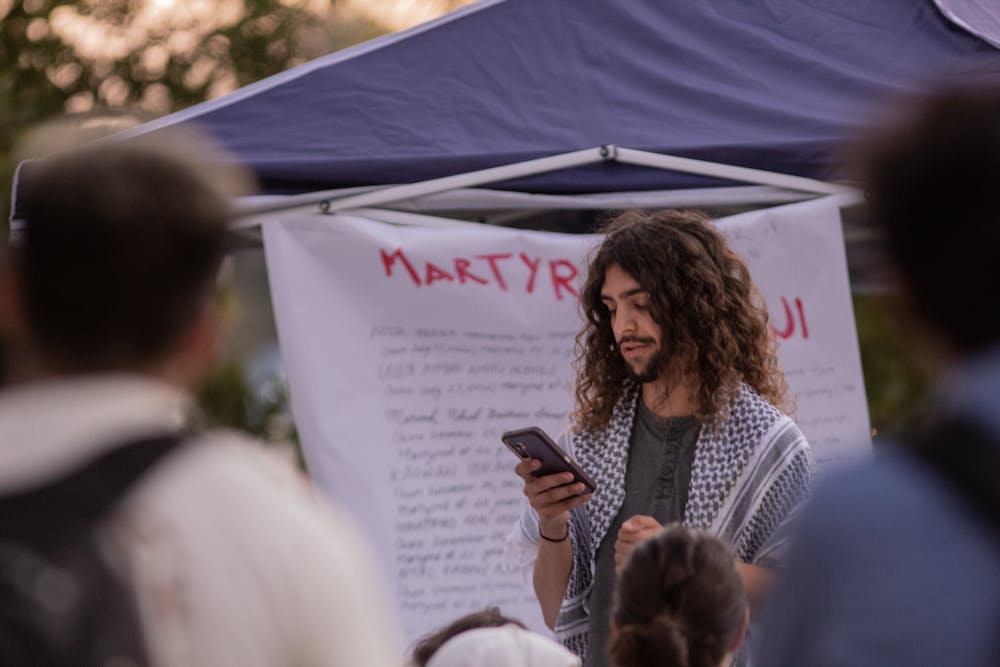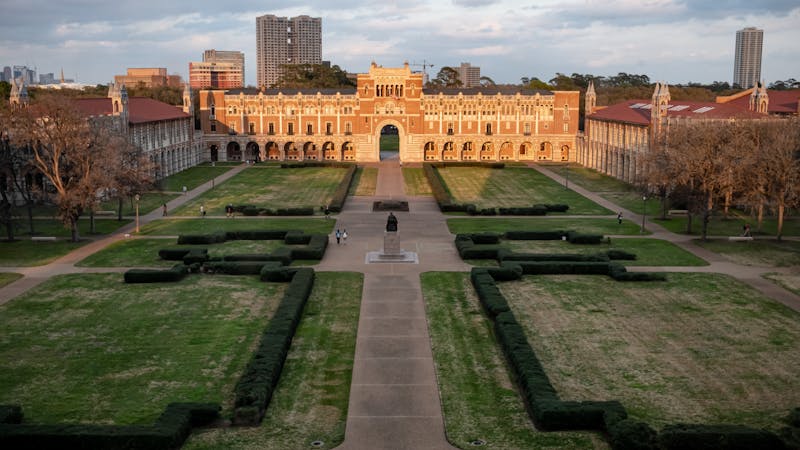Rice Students for Justice in Palestine remembers a ‘year of genocide’

Reflecting upon a “year of genocide,” Rice Students for Justice in Palestine hosted a vigil Oct. 7, honoring the tens of thousands of Palestinians killed since last year’s attacks on Israel.
In front of the provisional campus facilities’ tents, students, alumni and faculty shared poetry, speeches and stories. Videos of tarps and hands assembling fabrics were projected on the tent — reflective of the ongoing community-building efforts in the space, said Rice SJP organizer Erica Augenstein.
Later that evening, Chabad at Rice also led a vigil remembering the Oct. 7 attacks.
The vigil capped off Rice SJP’s “Day of Rage” and launched a series of demonstrations — dubbed a “Week of Rage” by the national chapter of SJP — in solidarity with Palestine. Events include a city-wide protest, study groups and teach-ins held throughout the week.
Before the vigil, Augenstein, a history Ph.D. student, led a presentation on the history of territorial disputes in Palestine. Nick Cooper ’91 also spoke about his work in community organizing during his time at Rice.
This week’s programming arrives months after student protests about the Israel-Hamas war swept universities — and as campuses brace themselves for a resurgence.
Abdel Razzaq Takriti, an associate professor of history and the Arab-American Educational Foundation Chair in Arab studies, shared the story of Rasha, a 10-year-old Gazan girl who wrote her own will distributing her allowance, toys and belongings among her family.
“In her will … a 10-year-old child asked her family not to cry over her,” Takriti said. “Her final request was that her brother, Ahmed, not be shouted at.”
Rasha’s story stands in “stark contrast” to the “complete lack of care for Palestinian life that we witness,” Takriti said in his speech.

Rice alumna Kathryn Jarjoura spoke after Takriti, reflecting upon her Lebanese heritage and its parallels to Palestine. Last month, Israel escalated its attacks in Lebanon, where over 2,000 people have been killed in the last year — most in the past two weeks, Reuters reported.
weeks, Reuters reported.
Both Lebanon and Palestine are “more than just a battlefield, like Western media likes to portray … [their people are fighting for] the right to exist in the land of [their] ancestors,” Jarjoura said in her speech.
Before reading two poems honoring Palestinians, Matti Haacke, a Rice SJP organizer and Sid Richardson College senior, shared a 650-page list naming those killed in Gaza over the past year. He passed the stack of papers to attendees as he began the poem recitations.
Fouad Salah, an organizer with the Palestinian Youth Movement and a University of Houston SJP chapter alumnus, spoke about the international community that Gaza has built over the last year.
“It’s hard to think of a reflection on the last year of genocide because it’s not past tense,” Salah said. “I think we can start by reflecting on what Gaza has done; it has chosen freedom in the face of the most technologically advanced weapons that have ever been created.”
Salah, who is ethnically Palestinian and from Jerusalem, said this year has reaffirmed that the “Palestinian people will not be defeated” and “they will give anything to defend their honor, their dignity and their national history on that land” in an interview with the Thresher.
“The people of Gaza have shown us that if they can stand with their head held high on their land as U.S.-made bombs drop on them, then we, as taxpaying American citizens, can confront U.S. imperialism and can confront genocide, and can do everything in our power to end the genocide,” Salah said during the vigil.
Daanesh Jamal, who attended the vigil, said he was saddened and overwhelmed by the long, yet incomplete, list of people killed in Gaza. He said one of the student-recited poems, “Tonight we die as a family,” affected him deeply.
“In Gaza, they’ve had to invent a new acronym amongst medical staff, WCNSF — wounded child, no surviving family — and just the idea that there’s just this kid there, and then [their] entire family has been killed, and it’s just wandering the rubble. It’s just so heartbreaking,” Jamal, a Will Rice College senior, said.
Salah ended the vigil by reading the names of the first 100 infant names in the list of Gazan deaths. After each name, he asked the audience to say shaheed, Arabic for “martyr.” According to Islamic belief, martyrdom represents “defending justice and fighting for justice,” he said.
“And as we leave tonight, let each name we read,” Salah said, “all the names that the Gaza Health Ministry could never capture because they’re still under the rubble, guide us to continued action, to continued commitment and dedication to freedom, justice and liberation for Palestine and the Palestinians.”
Sarah Knowlton contributed reporting.
More from The Rice Thresher

Rice accepts 13% of record-setting ED applications
Rice accepted 13.2% of Early Decision applicants in its first round of admissions for the class of 2029, said Yvonne Romero da Silva, vice president for enrollment. With 2,970 total applicants, this year saw yet another record-high; a 3% increase from last year’s previous high of 2,886. An additional 100 students gained admission through the Questbridge National College Match program, an uptick from last year’s 77.

Students reject divestment proposals
The student body voted to pass S.REF 01, which asks the Rice Management Company to disclose all of its holdings investments, but rejected the remaining divestment proposals. While every ballot measure gained a majority of votes in favor, the remaining three did not achieve the two-thirds majority required to pass.

Student organizations form coalition to support SA referenda
Four Student Association referenda open for the general student body vote today at noon. The referenda call for disclosure of Rice Management Company holdings and divestment from entities that profit off the Israel-Hamas war. The referenda also ask that Rice release a statement condemning genocide and materially support anti-colonial scholarship. Voting will close Dec. 11 at noon and the results will be published the next day. For the referenda to pass, a two-thirds majority with a 20% student body turnout is needed.

Please note All comments are eligible for publication by The Rice Thresher.